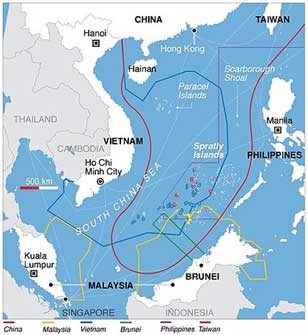South China Sea dispute and the ASEAN Bloc
China is having weak relationship with the member countries of ASEAN due to internal differences among member countries within themselves. The marked feature of the South China Sea dispute is the bundle of actors and their clashing interests over the supremacy of islands and ocean areas between two or more states.
China claims the largest area in consonance with its rather questionable nine-dash line, Southeast Asian nations such as Taiwan, Brunei, Malaysia, Vietnam, and the Philippines have their own disagreement regarding the resource-rich sea and the control of islands.
The Philippines and Vietnam have territorial feud with China over the Spratly Islands and Paracel Islands. The Philippines has claimed only the western portion of the Spratly Islands since 1970, whereas Vietnam just like China is second in claiming the parts of the two islands in the South China Sea.
Brunei, contrarily, claims its rights over the islands lying within their Exclusive Economic Zone (EEZ).
While Taiwan and Brunei are constantly provoked by China, Indonesia who’s claimed Exclusive Economic Zone (EEZ) overlies with that of China’s has also positioned itself against Beijing. China has also created stakes with the United States to maintain balance of power in the region.
The ASEAN member countries are currently deliberating the ‘Code of Conduct’ with China in the disputed sea. Many agreements were jointly formed but they were majorly compromise internal differences.
A unified approach in negotiating with China lacks because of difference in the economic, political, social and historical aspects with Beijing. They are economically dependent on Chinese markets and that causes a hindrance in taking any tough action against China.
Beijing is aware of the internal crisis among the ASEAN members and thus, prefers bilateral talks rather than multilateral discussions because it gives Beijing an edge due to its economic, political, military strength over any other individual country in the bloc which assures an almost winning place to China.
China dislikes the presence of United States in the region because it may cause obstruction in achieving hegemony in the Indo-Pacific region.
The South China Sea and the islands in the region are always in dispute because the region has an abundance of natural resources and hydrocarbon reserves. Richness of Fisheries, trade, oil, transportation also adds to its supreme strategic importance.
Member countries need to scale down their ‘sovereignty’ claims to reinforce the decision-making power of the ASEAN bloc to counter Beijing’s claims.








